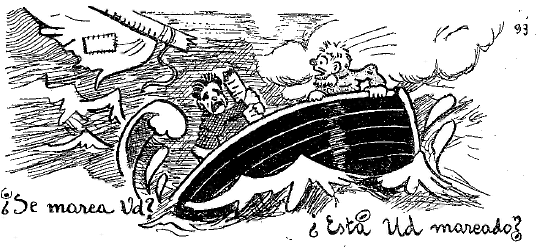
| Языки :: Испанский |
| Аудио |
 |
|
|
275 |
Español |
Spanish |
|
Lección Noventa y tres (93) |
||
| El mareo (1) | Sea-sickness. | |
| 1 | El comedor está muy concurrido (2) en el almuerzo, unas tres horas después de salir del puerto. | The dining-room is very crowded for [in the] lunch, about three hours after sailing out of [leaving] the harbour. |
| 2 |
El buque (3) parece inmóvil... Sólo mirando al agua por los ventanillos se da una cuenta del movimiento... |
The ship seems motionless. (It's) only (by) looking at the water through the portholes (that) one realizes [gives account] the motion... |
| 3 |
Al obscurecer, la brisa se aviva, rízase el mar y el buque
cabecea. A la hora de cenar hay algunas bajas por mareo (4). |
At the fall of day [at obscuring], the breeze becomes brisk, the sea
wrinkled and the ship pitches. At dinner-time there are a few victims of [losses by] seasickness. |
| 4 |
Después de cenar, la cubierta está casi vacía. Unos se han acostado temerosos del creciente oleaje; (5) |
After dinner, the deck is almost empty. Some people have gone to bed, fearing [afraid of] the increasing roughness of the waves; |
| 5 | otros han buscado refugio en el salón de música o en el bar. | others have sought refuge in the music-room or at the bar. |
| 6 | Algunos pasajeros, tendidos en las sillas de lona y bien envueltos en mantas, | A few passengers, lying on deck-[canvas-] chairs and well wrapped up in blankets, |
| 7 |
muestran esa indiferencia absoluta, incluso para la misma idea
de la muerte, que sienten los mareados. Bajo al camarote. |
show that absolute indifference, even including the idea of death that feel
victims of sea-sickness. I go down to my cabin. |
| EJERCICIOS | EXERCISE : | |
| Receta del cocido madrileño. | Recipe of Madrilenian boiled beef. | |
| 1 | En una olla se pone agua, y cuando está caliente, | In a cooking-pot, you [one] put water and when it is hot, |
| 2 | se echan garbanzos (puestos a remojo desde la noche anterior), y carne de vaca; | you throw the chick-peas (put into water [soaking] [since] the night before), and beef [meat of cow] : |
| 3 | por cada libra de carne, media libra de garbanzos. | for each pound of meat, half a pound of chick-peas. |
| 4 | Cuando principie a hervir, se espuma. | When it begins to boil, you skim. |
| 5 | Se deja hervir a fuego lento, sazonándolo con sal y añadiendo de cuando en cuando agua templada. | You leave it to boil on a slow fire, seasoning it with salt and adding from time to time warm water. |
| 6 | A las dos horas se añade jamón, trocitos de tocino, y una cebolla pequeña. | After [at the] two hours, you add ham, small bits of fat and a small onion. |
| 7 | Si se añade gallina resultará un cocido más sabroso. | If you add hen, you will get a more savoury boiled beef. |
| 8 | La verdura (repollo, apio, guisantes, nabos) se cuece aparte con chorizo y morcilla. | The vegetables (white-heart cabbage, celery, peas, turnips) are cooked separately, with saveloy and black pudding. |
| NOTES. | |
| 1 |
An extract from a short story of Araquistain. — Marearse, to be seasick. — ¿ Se marea Vd.? Are you subject to sea-sickness? — ¿ Está Vd. mareado? Are you sea-sick (now)? — Figuratively : Este asunto es un mareo. This business is nauseating. — Esta gente me tiene mareado, These people disgust me. |
| 2 |
La concurrencia, the bystanders, company; la
competencia, |
| 3 |
Un barco, a boat (generally). — Un buque, a ship (with covered deck), |
| 4 |
Al anochecer, at the fall of night. Al amanecer, at dawn. Tiene el pelo rizado, he has curly hair. — Cabecear, to nod (cabeza). Bajas (from bajar, to lower, put down) : casualties (in a fight). — Baja de precios, decline (of prices). |
| 5 |
Las olas, the waves; el oleaje, the swell. Hay oleaje, there is a heavy sea. — Crecer, to grow, increase. |
